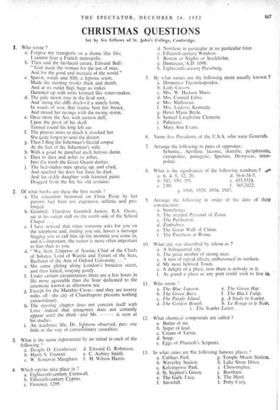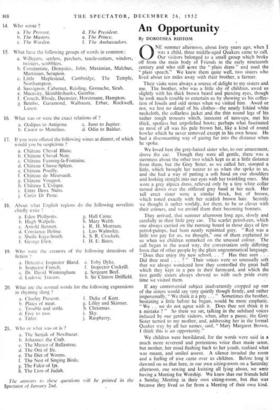CHRISTMAS QUESTIONS
Set by Six Fellows of St. John's College, Cambridge.
Who wrote ?
a. Forgive my transports on a theme like this; I cannot bear a French metropolis. b. Then said the fat-faced curate, Edward Bull: " God made the woman for the use of man, And for the good and increase of the world."
c. Spawn, weeds and filth, a leprous scum, Made the running a rivulet thick and dumb, And at its outlet flags huge as stakes Dammed up with roots knotted like water-snakes.
d. The paly moon rose in the livid east, And 'mong the cliffs disclos'd a stately form. In weeds of woe, that frantic beat her breast, And mixed her ravings with the raving storm. e. Once more the Ass, with motion dull, Upon the pivot of his skull Turned round his long left ear. f. The piteous news so much it shocked her She quite forgot to send the doctor.- g. Then I Hine the fisherman's flaccid corpse At the feet of the fisherman's wife.
h. With a goud he punched each furious dame.
i. Dust to dust and ashes to ashes. Into the tomb the Great Queen dashes.
j. The bed-ridden man sprang up, and cried. And reached the door but there he died, And his sickly daughter with frenzied pains Dragged from the fire his old remains.
2. Of what books are these the first words ?
a. The education bestowed on Flora Poste by her parents had been too expensive, athletic and pro- longed.
b. Gumbril, Theodore Gumbril Junior. B.A. Oxon., sat in his oaken stall on the north side of the School Chapel . . .
c. I have noticed that when someone asks for you on the telephone and, finding you out, leaves a message begging you to call him up the moment you come in, and it's important, the matter is more often important to him than to you.
d. " We, Seth, Emperor of Azania, Chief of the Chiefs of Sakuyu. Lord of Wanda and Tyrant of the Seas, Bachelor of the Arts of Oxford University ..."
e. She came gliding along London's broadest street. and then halted, swaying gently. f. Under certain circumstances there are a few hours in life more agreeable than the hour dedicated to the ceremony known as afternoon tea. Except for the Marabar Caves—and they are twenty miles off—the city of Chandrapore presents nothing extraordinary. h. The opening chapter does not concern itself with Love—indeed that antagonist does not certainly appear until the third—and Mr. is seen at his studies.
i. An academic life, Dr. Johnson observed, puts one little in the way of extraordinary casualties.
3. What is the name represented by an initial in each of the following ? a. Dwight D. Eisenhower. d. Edward G. Robinson. b. Harry S. Truman. e. C. Aubrey Smith. c. W. Somerset Maugham. f. H. Wilson Harris.
4. Which operas take place in ? a. Eighteenth-century Cornwall. b. Fifteenth-century Cyprus.
c. Florence, 1299. g. d. Nowhere in particular at no particular time.
e. Fifteenth-century Windsor.
f. Boston or Naples or Stockholm.
g. Damascus, A.D. 1098.
h. Eighteenth-century Pressburg.
5. By what names are the following more usually known 7 a. Domenico Theotokopoulos.
b. Lady Casson.
c. Mrs. W. Hudson Shaw.
d. Mrs. Connell Edris.
e. Mrs. Mallowan.
f. Mrs. Ludovic Kennedy.
g. Henri Marie Beyle.
h. Samuel Langhorne Clemens.
i. Palinurus.
j. Mary Ann Evans.
6. Name five Presidents of the U.S.A. who were Generals.
7. Arrange the following in pairs of opposites: Sybaritic, Apolline, laconic, diatribe, periphrastic, extrapolate, panegyric, Spartan, Dionysiac, inter- polate. .
8. What is the significance of the following numbers ?
a. 6, 4, 8, 12, 20. d. 16-6-34-5.
b. 543, 550, 551. c. 453.5924.
c. 2.80. f. 365.2422. g. 1900, 1929, 1934, 1947.
9. Arrange the following in order of construction : a. Stonehenge.
b. The stepped Pyramid of Zoser.
c. The Parthenon.
d. Zimbabwe.
e. The Great Wall of China.
f. The Pantheon at Rome.
10. What city was described by whom as ?
a. A beleaguered city.
b. The great mother of strong men.
c. A nest of ogival effects, embosomed in verdure.
d. My most beloved Town.
e. A delight of a place, now there is nobody in it.
f. As grand a place as any poet could wish to live goon. e. The Green Hat.
Bays. f. The Black Tulip.
sland. g. A Study in Scarlet.
Bough. . h. Le Rouge et le Noir,
. i. The Scarlet Letter. .
12. What chemical compounds are called ?
a. Butter of tin.
b. Sugar of lead.
c. Cream of Tartar.
d. Soup.
e. Eggs of Pharaoh's Serpents.
13. In what cities are the following famous places ?
a. Cathays Park. g. Temple Meads Station.
b. Waverley Station. h. Lake Shore Drive.
c. Kelvingrove Park. i. Chowringhee.
d. St. Stephen's Green. j. Bootham.
e. The Galle Face. k. The Hard.
f. Snowhill. 1. Petty Cury. the date of their
in. -
Who wrote ?
a. The Blue La
b. The Green
c. The Purple
d. The Golden 11.
14. Who wrote ?
a. The Provost. d. The President.
b. The Masters. e. The Prince.
c. The Warden. f. The Ambassadors.
15. What have the following groups of words in common: a. Willeyers, settlers, perchers, teazle-cutters, winders, twisters, scribblers.
b. Constantine, Dionysius, John, Maximian, Malchus, Martinian, Serapion.
c. Little M a plestead, Cambridge, The Temple, Northampton.
d. Sauvignon. Cabernet, Rcisling, Grenache, Sirah.
e. Macavity, Skimbleshanks, Gumbie.
f. Crouch, Rhode, Deemster, Horstmann, Hampton.
g. Bembo, Garamond, Walbaum, Erbar, Rockwell, Luxor.
16. What was or were the exact relations of ?
a. Oedipus to Antigone. c. Juno to Jupiter.
b. Castor to Menelaus. d. Odin to Baldur.
17. If you were offered the following wines at dinner, of which would you be suspicious ?
a. Chateau Cheval Blanc.
b. Château Cheval Noir.
c. Château Fanning-la-Fontaine.
d. Château Chasse-Spleen.
e. Château Pouilly.
f. Chateau de Meursault.
g. Château Vougeot.
h. Château L'Eveque.
i. Entre Deux Nuits.
j. Curse Dr Peste.
18. About what English regions do the following novelists chiefly write ?
a. Eden Phillpotts. g. Hall Caine.
b. Hugh Walpole. h. Mary Webb.
c. Arnold Bennett. i. R. H. Mottram.
d. Constance Holme. j. Leo Walmsley.
e. Sheila Kaye-Smith. k. S. R. Crockett.
f. George Eliot. 1. H. E. Bates.
19. Who were the creators of the following detectives of fiction ?
a. Detective Inspector Bland. e. Toby Dyke.
b. Inspector French. f. Inspector Cockrill. c. Dr. David Wintringham. g. Sergeant Beef.
d. Ludovic Travers. h. Sir Clinton Driffield.
20. What are the normal words for the following expressions in rhyming slang ?
a. Charley Prescott. f. Duke of Kent.
b. Plates of meat. g. Lilley and Skinner.
c. Trouble and strife. h. Christmas.
d. Five to two. i. Sky.
e. Titfer. j. Raspberry.
21. Who or what was or is ?
a. The Sanjak of Novibazar.
b. Johannes the Crab.
c. The Master of Ballantrae.
d. The Oni of lfe.
e. The Diet of Worms.
f. The Nest of Singing Birds.
g. The Fakir of Ipi.
h. The Lion of Judah.
The answers to these questions will be printed in the Spectator of January 2nd.



























 Previous page
Previous page